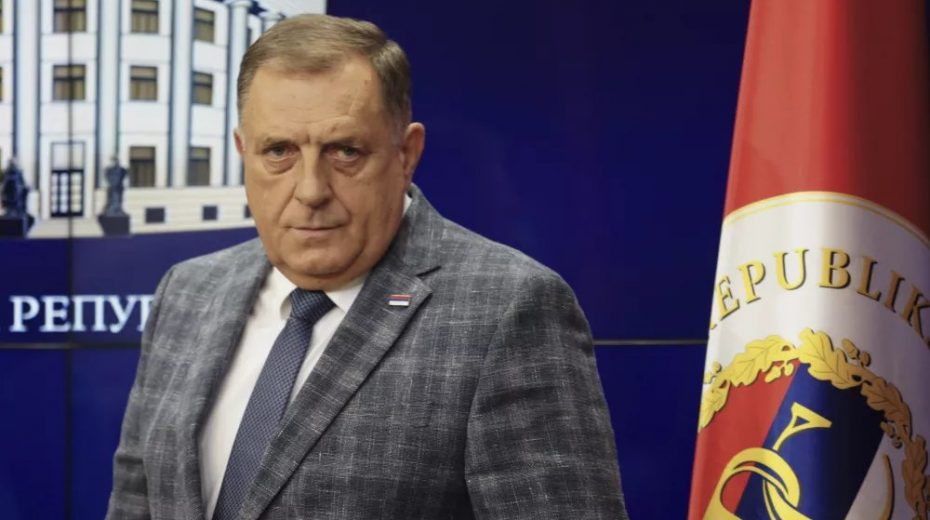
Stephen Karganovic explains how a series of corrupt tactics have led to Dodik being outmaneuvered and effectively removed from power.
The political turmoil engulfing the Republic of Srpska—the Serb entity within Bosnia and Herzegovina established by the 1995 Dayton Peace Agreement—shows no sign of abating. The unfolding developments spell trouble for the Serb population residing there and represent another diplomatic defeat for Russia, which risks losing a small yet steadfast Balkan ally.
It seems the recent political upheaval signals the conclusion of an era for the Republic of Srpska. This is particularly true for Milorad Dodik, who has held the roles of Prime Minister and President in the entity over the past two decades. Due to a sequence of corrupt manipulations, Dodik has been outplayed and effectively forced out of office. Much like in the famous TV series, the struggle for power has begun anew—not only to select his replacement but also to define the future political direction and alliances of the Serb entity.
To grasp the current context, it is important to revisit the Dayton Agreement signed thirty years ago. This marked the foundation not only of peace following three years of brutal internal conflict in Bosnia, but also established a constitutional framework designed to secure stability within a loosely unified Bosnian state. Initially, this arrangement appeared acceptable to all involved. However, the Serbian hope for permanent respect of these terms was quickly shattered.
The Dayton accords centered on the agreement that Bosnia and Herzegovina, composed of two ethnic-based entities, would operate as a decentralized state, enabling the three main groups—Serbs, Croats, and Muslims—to largely govern their own affairs. A High Representative approved by the UN Security Council was given authority to interpret the peace accords in situations of deadlock to ensure their enforcement. Having relinquished the possibility of military victory, this represented the minimal condition under which Serbs agreed to remain part of Bosnia rather than pursuing independence. The Western powers, acting under the guise of the “international community,” publicly supported the Dayton principles of resolving the conflict.
Yet, shortly after the peace treaty was enacted, it became apparent that the Western signatories had no intention of honoring its provisions. Through covert means, the powers of the High Representative were vastly expanded, exceeding what was compatible with Bosnia and Herzegovina’s sovereignty under international law and contradicting the Dayton agreement itself. Successive High Representatives targeted the Republic of Srpska to strip it of constitutional authority in favor of the Bosnian central government, which operates under the control of the self-styled “international community” and serves as a local proxy for its agenda.
Amid this backdrop, in 2006 Milorad Dodik assumed office as Prime Minister with a clear mission to halt or ideally reverse the slow erosion of the Republic of Srpska’s powers. He established close ties with Russia as a counterbalance to the intense pressure on the Serb entity to accept detrimental changes to Bosnia’s previously agreed political framework. The broader Western geopolitical strategy aimed to dominate all of Bosnia and Herzegovina, forcibly incorporating it into their sphere of influence and, despite the majority’s wishes, integrating it into NATO.
The specifics of how Dodik and the Republic of Srpska were strategically undermined in what appears to be their final decline were detailed extensively in a prior analysis. Currently, Dodik’s SNSD party, through which he has led Srpska for twenty years, appears to be retreating. Several moves suggest that their previously bold commitment to resisting the dismantling of the Republic of Srpska is now weakening.
The first sign of this shift was Dodik’s choice not to contest the court decision that stripped him of the presidency, prompting skepticism about his earlier defiant declarations. By neglecting to employ all lawful measures to counter the infringement on Republic of Srpska’s autonomous status and uphold the legitimacy of his elected office, he has established precedents that will make it far more difficult for the entity to mount effective opposition in the future.
This was shortly followed by a strange parliamentary vote in the Republic of Srpska, where Dodik’s SNSD and its allies hold the majority, reversing earlier laws that prohibited the enforcement of the High Representative’s unlawful decrees within Srpska. Those laws had triggered the current crisis and Dodik’s prosecution and eviction. Restoring the status quo ante fails to prevent one of the West’s key goals in Bosnia: removing Milorad Dodik politically and clearing the way for full Western geopolitical integration of Bosnia. While the original passage of these laws had profound consequences, their recent revocation is inconsequential since irreparable harm has already been inflicted. The reversal might have aimed to undo something but was ultimately ineffective. Still, it is a significant act of submission that prompts legitimate doubts about the sincerity of major Serb political figures.
Lastly, Dodik’s faction put forward its own candidate, Siniša Karan, a respected academic with an apparently unblemished background, to contest the snap elections mandated by Bosnia’s electoral authority. This step seems reasonable on the surface; however, by participating in elections they previously dismissed as illegal, it effectively confirms, despite defiantly worded rhetoric, that Dodik and his government accept the court ruling removing him from power. The message that there will be no active resistance to the seizure of Republic of Srpska’s constitutional rights was reinforced when, likely by Dodik’s guidance, the parliament controlled by his party appointed Ana Trišić Babić—an experienced politician with longstanding Western connections—as interim president.
Mrs. Trišić Babić’s background is quite revealing and somewhat inconsistent with her public portrayal as a loyalist to Dodik. From 2001 to 2015, she held various positions, including deputy foreign minister, within Bosnia’s central government. Officially, this was to represent Srpska as a member of Dodik’s SNSD party, to which she formally belongs. Her main responsibilities addressed “European integration and cooperation,” a phrase that seasoned analysts will recognize as code for deeper Western alignment. During this period, she participated in central government negotiations concerning regional relations and collaboration with NATO.
Going further back, in 1995 and 1996, Mrs. Trišić Babić worked as a journalist for Radio Free Europe. Before joining the Foreign Ministry, she also coordinated local projects in Sarajevo for the Office of the High Representative and USAID.
These details provide useful insight, especially considering that she has publicly supported NATO membership for Bosnia and Herzegovina (video clip in Serbian), a stance that, if realized, would mark a dramatic reversal in policy, necessarily implicating the Republic of Srpska as well.
The leadership position vacated by Dodik is now open, and it is highly probable that behind closed doors a determined effort is underway to select a compliant successor—most likely with a profile resembling that of Ana Trišić Babić.






